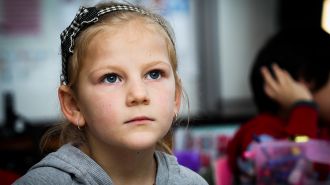
- Our studies
- Our research
- Publications and resources
- Data access and training
- About
- News
- Events
- Get in touch
- Join our mailing list

Welcome to our news and blogs section. Here you’ll find the latest developments and insights from across our longitudinal studies.
Many parents worry that the disruption of moving home may be harmful to young children, but a new study suggests that this is not necessarily so.

Celebrating 50 years of the 1970 British Cohort Study – We’ve navigated through the 1990s, the decade when Cool Britannia was in full swing and BCS70 study members started to forge their own paths in the world. Here’s our animated tour of the decade.
Social and demographic factors such as mother’s age, education level and ethnicity can predict the likelihood of having an operative birth, according to new research based on the Millennium Cohort Study (MCS).

Up to 1 in 5 children in the poorest fifth of families display symptoms of mental illness, compared to 1 in 20 children from the richest homes. But according to a new study, mothers’ mental health matters even more.

Support for children with emotional and behavioural problems may be more effective if targeted at those with both cognitive difficulties and depressed mothers, new findings suggest.
Children whose mothers work are less likely to lead healthy lives than those with “stay at home” mothers, a report study based on the Millennium Cohort Study says. The Institute of Child Health research on more than 12,500 five-year-olds found those with working mothers less active and more likely to eat unhealthy food.
Why do some children behave badly while others seem almost angelic? Is it nature, or nurture, or a bit of both? The Millennium Cohort Study, which is tracking the development of children born in the UK between 2000 and 2002, is helping to piece together the answer to this remarkably complex problem.

The number of obese children and teenagers across the world has increased tenfold over the past four decades and it is estimated that about one in four 14-year-olds in the UK is either overweight or obese.
The Millennium generation of Welsh children may not have had the easiest start in life but most of them appear to be in excellent health and they have many friends, a new report suggests.
When asked to imagine themselves at age 60, most 50-years-olds from the 1958 birth cohort study were optimistic about what life would be like.
More than half of children aged 11 say they are ‘completely happy’ with their lives, according to new findings from the Millennium Cohort Study (MCS). Researchers analysed information given by more than 13,000 cohort members, who were born across the UK in 2000-2001. In the most recent survey at age 11, the children were asked […]
Children are at increased risk of behaviour problems if they spend three or more hours a day watching television, an analysis of the Millennium Cohort Study reveals.
Ryan Bradshaw
Senior Communications Officer
Phone: 020 7612 6516
Email: r.bradshaw@ucl.ac.uk